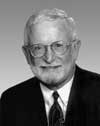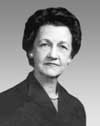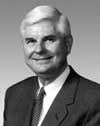Robert S. Braden

Robert Braden (UT ’53, MIT ’54), known as Bob to his friends, was born in West Texas in 1931. In 1955, Bob joined the consulting firm of Freese, Nichols, Turner and Collie with a staff of 27 people. When he retired 35 years later after serving as both president and CEO, the name of the firm had changed to Turner Collie & Braden and employed over 300 people.
In addition to developing one of the major full service engineering consulting firms in Texas, Bob was a transportation visionary and a key advisor to elected community leaders. He recognized that communities should have funding options to accelerate needed transportation projects, and this vision became a reality when voters approved the creation of the Harris County Tollroad Authority. He also worked closely with state and community leaders to develop approaches for public-private partnerships and was instrumental in the creation of the Grand Parkway Transportation Corporation.
Bob Braden believed an engineer’s number one duty and responsibility was to provide society with an improved environment.
Robert Braden was awarded an honorary degree from Texas A&M University and was named a Distinguished Graduate of the College of Engineering at the University of Texas at Austin.
E. Neveille Colson

Born in Bryan in 1902, Neveille Colson would serve 28 years in the Texas legislature. She was the first woman elected to both the Texas House and Senate. Throughout her political career, she was a strong transportation advocate.
From 1939 to 1948, Ms. Colson served in the Texas House. In 1946, she became the first woman to introduce a constitutional amendment that was approved by the legislature and passed by the voters. The “good roads” amendment ensured that road user taxes would be used for highway purposes by dedicating 75 percent of motor fuel taxes and vehicle registration fees to constructing and maintaining state highways.
She served in the Texas Senate from 1948 to 1966. In 1949, along with then State Representative Dolph Briscoe, she co-sponsored the Colson-Briscoe Act. Funded by a special appropriation, this act provided for the construction of a network of paved roads in rural areas designed to, in her words, move rural school transportation and mail delivery “out of the mud”. These Farm-to-Market roads now comprise over half of the TxDOT road system.
The longest girder bridge in Texas, near historic Washington-on-the-Brazos, was named the Neveille H. Colson Bridge in recognition of her contributions to Texas roads.
James D. “Doug” Pitcock, Jr.

Doug Pitcock (A&M ’49), with Claude and John Williams, formed Williams Brothers Construction Company in 1955. Mr. Pitcock is owner, Chairman of the Board, and CEO. Under his leadership, Williams Brothers has become one of the largest highway/heavy contractors in the nation.
Mr. Pitcock has been a prominent transportation leader for over 40 years. He served as chairman of the Houston Chamber of Commerce transportation committee, and was twice president of the Texas Highway Branch of the Associated General Contractors. In 1984 he was national President of the Associated General Contractors of America.
President Ford named Doug to serve on the National Transportation Policy Study Commission, and Governor Smith appointed him to serve on the Texas State Board of Registration for Professional Engineers.
As testament to his abilities to advance transportation issues, a 1984 Engineering News Record cover story referred to Mr. Pitcock as the “gentle persuader.” Doug was inducted into the Texas Good Roads/Transportation Association’s Hall of Fame, and was named one of the “Top 100 Private Sector Transportation Construction Professionals of the 20th Century” by the American Road and Transportation Builders Association. He is a Distinguished Civil Engineering Alumnus of Texas A&M University.
Ray Stoker, Jr.

A lifelong resident of Odessa, Ray Stoker (Baylor ’61, Baylor Law School ’64) has been a tireless advocate for Texas transportation programs for over three decades. Ray is one of only four Texans appointed to the state transportation commission by two different governors.
He was first appointed to the State Department of Highways and Public Transportation Commission in 1985 by Governor White. In 1991, after successfully shepherding the Department through both a penetrating Sunset review of its mission and the creation of the Texas Department of Transportation, Governor Richards named Ray Stoker as the first chairman of new Texas Transportation Commission.
Mr. Stoker helped lead successful initiatives to increase the state motor fuel tax in 1986, 1987 and 1991. He advocated both rural and urban transportation issues and was instrumental in the development of the Texas Highway Trunk System, a 10,500 mile system of rural highways. He broadened the Department’s scope by working to create divisions devoted to civil rights, environmental affairs, public transportation, and general aviation.
After leaving the commission in 1993, he became the longest serving chairman of the Texas Good Roads/Transportation Association, serving in that capacity until 2003.